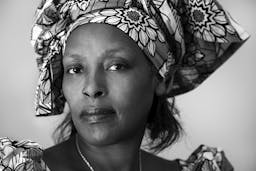THE BACKLASH OF RAPE IN THE CONGO: The Beastly Plague Infecting the Male Mind
Apr 23, 2020
Story

A study recently published in the American Journal of Public Health states that 67 of every 1000 women and girls are raped at least once in the North Kivu Province of Eastern Congo. This statistic was compared to an annual rape rate of 0.5 per 1,000 women in the United States, and so the Journal asserts: “That means a woman in certain parts of the Congo is 134 times more likely to be raped than a woman in the United States.” But of course, beyond the numbers, these are our mothers and sisters and nieces. These statistics don’t come close to revealing the damage done to families and communities, nor do they touch the horror of our daughters being gang raped multiple times, or that suffer mutilation or end up dying as a result of the brutality. But when put alongside numbers from further research, an image begins to emerge showing clearly that women in Congo are caught up in a pandemic of gender violence, perpetuated by a nationwide devolving male conscience. And when fleeing the conflict zones to the cities, they find the same mind prevalent, with the added pressure of this environmental consciousness to now volunteer their bodies in order to support their families. This is the picture coming clearly into view today. And that’s the good news, because an enemy we can see, we can fight to its finish. A PANDEMIC OF MARGINALIZATION It may be a stretch to say that there’s a proliferation of marginalization against women in Congo that is unparalleled in the history of the world, but it is significant enough for leading international health experts to sound a global alarm. Michael VanRooyen, MD, MPH, the Director of the Harvard Humanitarian Initiative, said that “the message is important and clear: Rape in the DRC has metastasized amid a climate of impunity, and has emerged as one of the great human crises of our time.” Proof that gender violence in Congo has grown pandemic – no longer limited to the armed conflict zones – is found in the alarming results of a study recently conducted by Johns Hopkins' Bloomberg School of Public Health. It revealed that although sexual violence is prevalent in all provinces, “the outlier Equateur Province showed rates higher than the conflict-affected South Kivu and Orientale provinces. This is a new and highly significant finding.” Yet the world and my government carry on as if these 1152 women each day – over 400,000 women each year – were simply stubbing a toe on their way to fetch water. THE DEATH OF CONSCIENCE The situation in Congo is tantamount to a sweeping social religion of convenience, not so dissimilar to Nazism. There’s a psychological indoctrination taking place, which perhaps gets its footing from the years and years of conflict wars. But continuing poverty, injustice, and lack of accountability have given rise to a cultic mentality that women only exist for the sport and service of men. Things have devolved to the extent that there’s now no conscience against any form of violation, including torture, mutilation, or even murder. The findings overwhelm typical rape statistics. They point to a gendercide taking place in the male psyche. It’s an uncontained, unnatural disaster that is running unchecked, and therefore out of control. In 2009 there was an incident in Minembwe, a very remote area of South Kivu Province. Some young people were walking home from choir practice; a group of girls leading with their brothers and male friends following behind, 100 meters or so. Three armed soldiers came upon the girls and took one captive into the bushes to rape her. She was screaming and screaming, and her older brother heard and came running. He stopped a distance away and called out to the soldiers who were assaulting her, asking them not to harm her. One of the soldiers fired his weapon at the brother and killed him. The community was outraged and after some time, the three soldiers were put in prison. I confronted the Colonel, the number 2 military authority in our province, and said: “Colonel, you give your soldiers guns to protect the citizens, or to rape young girls and kill their brothers?” The colonel replied, “It is bad that the soldiers killed the boy, but the girl; girls are for sex. Me too, I could have this girl for sex. This incident is a tragedy because the young man was killed.” This culturally acceptable dynamic was recently referred to in an account shared with me by a doctor friend of mine who has given herself to treating and supporting rape victims since she graduated university. She told me that she recently accompanied one of her patients, a young and pregnant victim, to support her for her day in court. The judge, who happens to be head of the government judicial body in our province, clearly had no empathy for the young woman. He said, “This law [prohibiting rape] has got to be changed. This law was imported and doesn’t fit in our culture. Before the wars we didn’t even have a word for rape. This is normal behavior for our people.” Rape has, indeed, been a part of our culture for longer than I can remember. It was not at all uncommon, even before the war, for a young man to come across a girl and rape her. This “incident” would be handled behind closed doors between male parents; the father of the raped daughter expecting to be “compensated” for the damage with cows or a sum of money. It wasn’t called rape; it was just something that happened. A HEARTBREAKING CONSEQUENCE Tragically, women who flee the violence of their rural homelands to the cities often end up engaging in transactional sex for survival. Bukavu is overwhelmed with the influx of displaced families. Many flow over into the small town across the border in Rwanda, where housing is more affordable and security in greater force. Women cross back each day, carrying containers of milk on their heads to sell in the heart of our capital city some four kilometers away. One of these women said, “There are many times at the end of the day that a construction worker building a house will say he wants to buy the milk, and will then ask the woman to take it to one of the rooms under construction. If she accepts, she can get another $2 for her family before she goes home.” One young woman noted that the presence of foreign aid workers has stoked the demand for prostitution. “We have a lot of NGOs in Bukavu right now, and their presence has contributed to that [prostitution]. The money that young girls received from NGO agents encouraged the spread of prostitution,” she said. Women are defiled by rape, then stigmatized and ostracized, and then fleeing to the cities are forced to submit to a recurring violence of their standing as women and mothers, now “willingly” giving themselves over to these heartbreaking indignities for their own as well as their children’s survival. WHAT ISN’T BEING DONE And where do the women of Congo turn for help? As already stated, our military and justice systems are at best unwilling law enforcement agents, and at worst the very promoters and even perpetrators of these insidious acts. I had an opportunity to meet with the new U.S. Ambassador to Congo early last year as part of a panel brought together to address America’s concerns regarding the violence against women in Eastern DRC. He had come to Congo with $17,000,000 to help fight the rape crisis in Eastern Congo. So when my turn came to address the ambassador, I told him, our problem Mr. Ambassador, is that “We don’t classify these criminals as terrorists, but as leaders of military forces who need to be negotiated with and assimilated into the national armed forces, and given a territory and stars on their shoulders and a budget to continue their reign of terror. The U.S. kills terrorists; we promote them, give them General’s stripes, a budget and a territory to continue their reign of terror. With that policy, you will never see an end to the violence in East Congo.” According to the United States Department of State, the U.S. “is proud to have played a role in the peace process in the DRC, and continues to encourage Congolese peace, prosperity, democracy, and respect for human rights. The U.S. Government provided $306 million in bilateral assistance to the DRC in 2010 to support economic reform and transparency efforts. The United States is also the largest donor to the United Nations stabilization mission in the DRC (MONUSCO), contributing almost one-third of MONUSCO’s $1 billion annual budget.” That’s over $600,000,000 in 2010 alone. There’s a real problem when you can throw a chunk of money -- the size of 1/20 of Congo’s GDP -- at this problem, and not even see a ripple in the water. Where are these dollars circling that they never touch ground? I think I can include the American people and say we would all like to see something more tangible for $600,000,000 than “economic reform and transparency efforts.” MONUSCO is the U.N.’s largest presence in the world, and as stated, has a billion dollar annual budget. But what are they actually effecting if violence against women continues to escalate, and escalate to the point that the male psyche toward women becomes increasingly bestial? And while there are reports every year of MONUSCO’s forces contributing to the perverse consciousness of sexual abuse toward our women, little attention is given to the role their 20,000+ personnel play in “stoking the demand” for prostitution here. After 13 years, it’s time to take a more aggressive approach. WHAT MUST BE DONE A World War is called for by the global defenders of human rights; not the passive and pacifying presence of MONUSCO. Aggressive action must be waged against the pandemic mind that disregards the very gender that brought them into the world, and that justifies torturing us and mutilating our bodies, and leaving us for dead. We need an international mobilization that is of the scale set against HIV/AIDS. Militant action is warranted. The time for the world to act is NOW against this deadly plague, which began against women, but has now metastasized to the minds of our sons. We are dug in here, immovable, taking our stand with the others who are fighting from the inside, and will continue to sound forth until we are heard. And we are calling you out, you global defenders of human rights. The heart of the new Congo is calling you. These are the heart-cries of new life coming forth, desperate to be delivered that we might breathe the same air of freedom you are breathing. Hear us; our voices will not be quieted. Amidst the sound of footsteps all around us threatening death, WE ARE STANDING FOR LIFE; the kind of Life we can’t enjoy until everyone is able to enjoy it with us. We too wish to sing that our land is “the land of the free, and the home of the brave.” And so for Congo we pray: “God, shed your grace on thee.” To learn how you can stand with and support my sisters here in the DRC to hold out until this war is finished, visit http://www.womenforwomen.org. This article is part of a writing assignment for Voices of Our Future a program of World Pulse that provides rigorous new media and citizen journalism training for grassroots women leaders. World Pulse lifts and unites the voices of women from some of the most unheard regions of the world.




